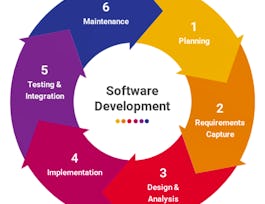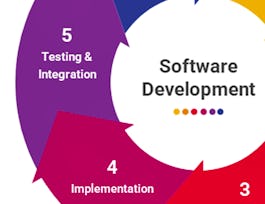Software Development Life Cycle (SDLC) is the process of developing software through planning, requirement analysis, design, implementation, testing, and maintenance. This course focuses on the project planning and analysis/design phases of SDLC, and you will learn about different architectural patterns and design patterns to solve common problems in software design. It covers project planning, scheduling, and cost estimating, which are the principal tasks of software project managers.


Software Engineering: Software Design and Project Management
This course is part of Software Engineering Specialization
Taught in English
Some content may not be translated

Instructor: Kenneth W T Leung
10,475 already enrolled
Included with 
Course
(90 reviews)
Recommended experience
Skills you'll gain
Details to know

Add to your LinkedIn profile
6 quizzes
Course
(90 reviews)
Recommended experience
See how employees at top companies are mastering in-demand skills

Build your subject-matter expertise
- Learn new concepts from industry experts
- Gain a foundational understanding of a subject or tool
- Develop job-relevant skills with hands-on projects
- Earn a shareable career certificate


Earn a career certificate
Add this credential to your LinkedIn profile, resume, or CV
Share it on social media and in your performance review

There are 6 modules in this course
Welcome to the first module of this course! In this module, you will learn: (1) The purpose and importance of system analysis and design. (2) The major activities that take place during system analysis and design. (3) How to realize design goals and deal with the implementation environment. (4) What are architectural patterns and design patterns and when to use them.
What's included
4 videos3 readings1 quiz
In this module, you will learn: (1) How to use a state machine diagram to describe the behavior inside an object.
What's included
2 videos3 readings1 quiz
In this module, you will learn: (1) A design pattern is a general reusable solution to a commonly occurring problem in software design. (2) Strategy Pattern. (3) Observer Pattern.
What's included
3 videos3 readings1 quiz
In this module, you will learn: (1) Mediator Pattern. (2) Proxy Pattern. (3) Bridge Pattern. (4) Singleton Pattern. (5) Factory Pattern. (6) When to use design patterns. (7) Anti Patterns.
What's included
5 videos3 readings1 quiz
In this module, you will learn: (1) The quality assurance process and the central process activities of quality assurance, quality planning and quality control. (2) The quality assurance process and the central process activities of quality assurance, quality planning and quality control. (3) The principles of software development process improvement and why process improvement is worthwhile.
What's included
4 videos1 reading1 quiz
In this module, you will learn: (1) The principal tasks of software project managers. (2) The need of project planning in all software projects. (3) Requirements for staffing and scheduling in software projects. (4) Techniques for estimating the size and cost of software development. (5) Project tracking and control.
What's included
3 videos1 reading1 quiz
Instructor

Recommended if you're interested in Software Development

The Hong Kong University of Science and Technology

Johns Hopkins University

The Hong Kong University of Science and Technology

École Polytechnique
Why people choose Coursera for their career




Learner reviews
Showing 3 of 90
90 reviews
- 5 stars
77.77%
- 4 stars
14.44%
- 3 stars
3.33%
- 2 stars
2.22%
- 1 star
2.22%
New to Software Development? Start here.

Open new doors with Coursera Plus
Unlimited access to 7,000+ world-class courses, hands-on projects, and job-ready certificate programs - all included in your subscription
Advance your career with an online degree
Earn a degree from world-class universities - 100% online
Join over 3,400 global companies that choose Coursera for Business
Upskill your employees to excel in the digital economy
Frequently asked questions
Access to lectures and assignments depends on your type of enrollment. If you take a course in audit mode, you will be able to see most course materials for free. To access graded assignments and to earn a Certificate, you will need to purchase the Certificate experience, during or after your audit. If you don't see the audit option:
The course may not offer an audit option. You can try a Free Trial instead, or apply for Financial Aid.
The course may offer 'Full Course, No Certificate' instead. This option lets you see all course materials, submit required assessments, and get a final grade. This also means that you will not be able to purchase a Certificate experience.
When you enroll in the course, you get access to all of the courses in the Specialization, and you earn a certificate when you complete the work. Your electronic Certificate will be added to your Accomplishments page - from there, you can print your Certificate or add it to your LinkedIn profile. If you only want to read and view the course content, you can audit the course for free.
If you subscribed, you get a 7-day free trial during which you can cancel at no penalty. After that, we don’t give refunds, but you can cancel your subscription at any time. See our full refund policy.

